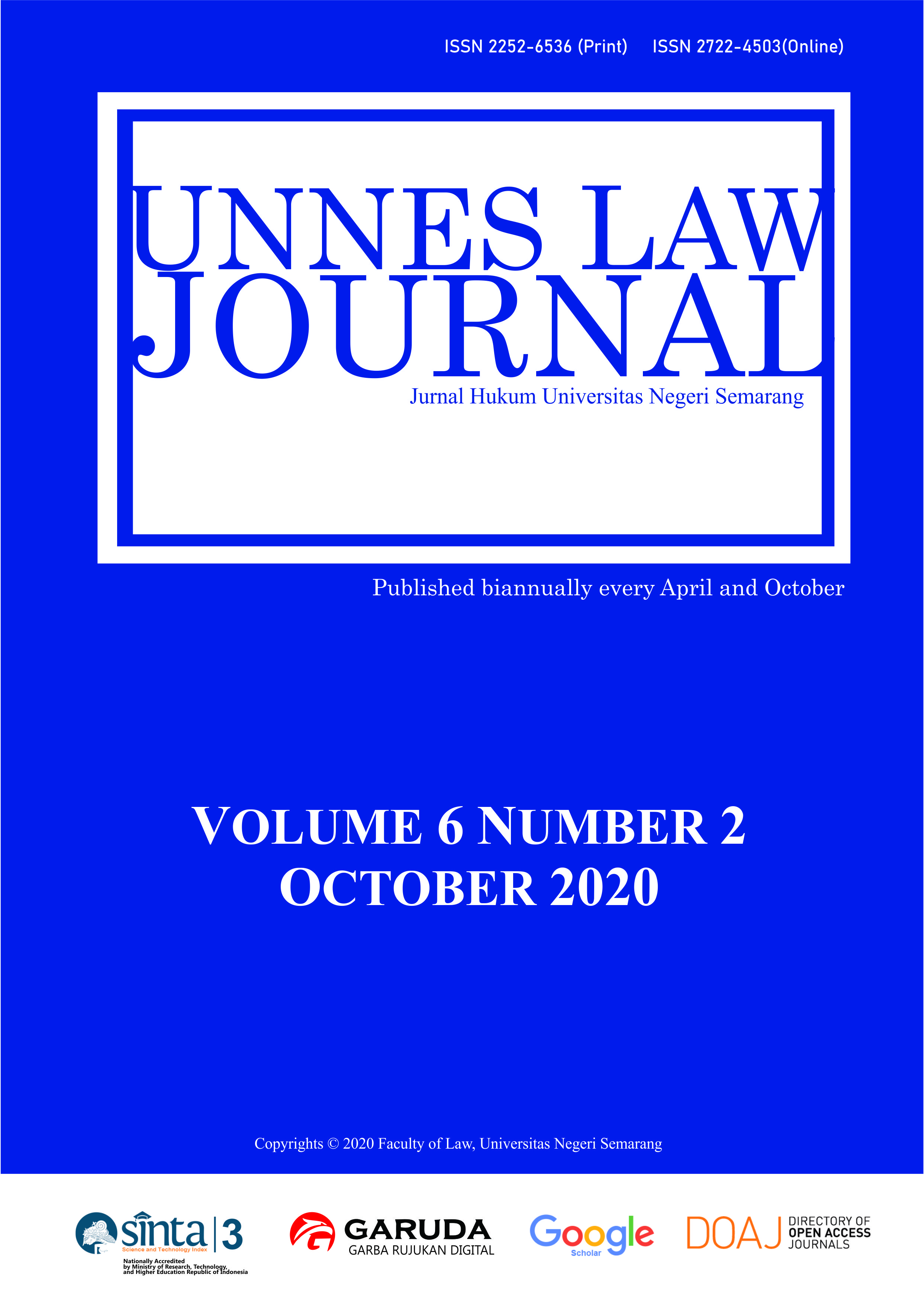Death Penalty for Corruptors in Indonesian Human Rights Perspective Human Rights Law, Law and Policy
Main Article Content
Abstract
The death penalty for corruptors, gaining a place in Indonesia's positive criminal law. As a country that makes Pancasila an ideology, it is interesting to be reviewed in this paper on the existence of the death penalty for the corruptor from a human rights perspective in Indonesia. Therefore, the author raised two issues, namely the first, how is the death penalty for corruptors in Indonesia's positive law? second, what about the death penalty for such corruptors if reviewed from a Human Rights perspective in Indonesia? To answer this, the authors chose legal research with a normative approach as part of its research methods. Based on the study obtained that the death penalty for corruptors does not conflict with Indonesian human rights values, because it is seen as the most serious crime. Even the formulation of the death penalty is currently seen as in line with the direction and ideals of reforming Indonesia's criminal law, which is increasingly humanist and puts forward the purpose of justice and benefit.
Article Details
References
Brata, R. A. (2015). Pro Kontra Hukuman Mati (Bagi Pelaku Kejahatan Narkoba). Sekretariat Kabiner Republik Indonesia. Retrieved from https://setkab.go.id/pro-kontra-hukuman-mati-bagi-pelaku-kejahatan-narkoba/
Ceswara, D. F., & Wiyatno, P. (2018). Implementasi Nilai Hak Asasi Manusia Dalam Sila Pancasila. Lex Scientia Law Review, 2(2), 227–241.
Chazawi, A. (2013). Pelajaran Hukum Pidana: Bagian I. Jakarta: Rajawali Pers.
Dahwir, A. (2019). Pengembanan Filsafat Pancasila Dalam Sistem Pemidanaan Di Indonesia. Solusi, 17(1), 14–22.
Eleanora, F. N. (2012). Eksistensi Pidana Mati Dalam Perspektif Hukum Pidana. Majalah Ilmiah Widya, 29(318), 10–14.
Hamenda, V. L. (2013). Tinjauan Hak Asasi Manusia Terhadap Penerapan Hukuman Mati Di Indonesia. Lex Crimen, 2(1), 113–119.
Hamid, M. A. (2015). Penerapan Hukuman Mati Bagi Terpidana Koruptor Ditinjau Dari Perspektif Hak Asasi Manusia. Legal Pluralism, 5(2), 171–201.
Hatta, M. (2019). Kejahatan Luar Biasa (Extra Ordinary Crime). Lhokseumawe: Unimal Press.
Hikmah, H., & Sopoyono, E. (2019). Kebijakan Formulasi Sanksi Pidana Mati Terhadap Pelaku Tindak Pidana Korupsi Berbasis Nilai Keadilan. Jurnal Pembangunan Hukum Indonesia, 1(1), 78–92.
Hutapea, B. (2016). Alternatif Penjatuhan Hukuman Mati di Indonesia Dilihat dari Perspektif HAM. Jurnal Penelitian HAM, 7(2), 69–83. Retrieved from http://ejournal.balitbangham.go.id/index.php/ham/article/view/170http://ejournal.balitbangham.go.id/index.php/ham/article/view/170
Ilyas, A. (2012). Asas-Asas Hukum Pidana Memahami Tindak Pidana Dan Pertanggungjawaban Pidana Sebagai Syarat Pemidanaan. Rangkang Education Yogyakarta & PuKAP-Indonesia. Yogyakarta: Rangkang Education Yogyakarta & PuKAP-Indonesia.
Kementerian Pendidikan dan Kebudayaan Republik Indonesia. (n.d.). No Title. Badan Pengembangan dan Pembinaan Bahasa, Kementerian Pendidikan dan Kebudayaan Republik Indonesia. Retrieved from https://kbbi.kemdikbud.go.id/entri/kaya
Latumaerissa, D. (2014). Tinjauan Yuridis Tentang Penerapan Ancaman Pidana Mati Dalam Tindak Pidana Korupsi. Jurnal Sasi, 20(1), 8–18. Retrieved from https://adoc.tips/volume-20-nomor-1-bulan-januari-juni-2014-issn-jurnal-ilmiah1b7c862f2f5ee667633d61d6ed66ae9c55963.html
Lon, Y. S. B. (2017). Pendidikan HAM, Gender dan Antikorupsi. Ruteng: STKIP St. Paulus.
Maroni. (2016). Pengantar Politik Hukum Pidana. Lampung: Aura Publishing.
Muhtaj, M. El. (2015). Hak Asasi Manusia Dalam Konstitusi Indonesia: Dari UUD 1945 Sampai Dengan Perubahan UU 1945 Tahun 2002. Jakarta: Kencana.
Oktavianto, R., & Abheseka, N. M. R. (2019). Evaluasi Operasi Tangkap Tangan KPK. Integritas: Jurnal Antikorupsi, 5(2), 117–131.
Rachman, D. A. (2019). ICW: Tahun 2018, Rata-rata Vonis Koruptor 2 Tahun 5 Bulan. Kompas.com. Retrieved from https://nasional.kompas.com/read/2019/04/28/17302541/icw-tahun-2018-rata-rata-vonis-koruptor-2-tahun-5-bulan
Rahardjo, S. (2010). Sosiologi Hukum: Perkembangan Metode dan Pilihan Masalah. Yogyakarta: Genta Publishing.
Sahetapy, J. E. (1982). Suatu Studi Kasus Mengenai Ancaman Pidana Mati Terhadap Pembunuhan Berencana. Jakarta: Rajawali.
Sefriani. (2013). Karakteristik the Most Serious Crime Menurut Hukum Internaional Dalam Putusan Mahkamah Konstitusi. Jurnal Yudisial, 6(2), 95–106. Retrieved from http://jurnal.komisiyudisial.go.id/index.php/jy/article/view/107/91
Soebagjo, N. (n.d.). Corruption Perception Index 2012. Transparency International Indonesia (TI-Indonesia). Retrieved from https://riset.ti.or.id/corruption-perception-index-2012/
Tim CNN Indonesia. (2020). ICW: 4 Tahun Berturut Koruptor Rata-rata Terima Vonis Ringan. CNN Indonesia. Retrieved from https://www.cnnindonesia.com/nasional/20200419190921-12-495064/icw-4-tahun-berturut-koruptor-rata-rata-terima-vonis-ringan
Toule, E. R. M. (2013). Eksistensi Ancaman Pidana Mati Dalam Undang-Undang Tindak Pidana Korupsi. Jurnal Hukum PRIORIS, 3(3), 103–110.
Wibowo, R. A. (2018). When anti-corruption norms lead to undesirable results: learning from the Indonesian experience. Crime Law and Social Change, 70(3), 383–396. Crime, Law and Social Change.
Widayati, L. S. (2016). Pidana Mati Dalam RUU KUHP: Perlukah Diatur Sebagai Pidana Yang Bersifat Khusus? Negara Hukum: Membangun Hukum untuk Keadilan dan Kesejahteraan, 7(2), 167–194.
Yudianto, O. (2016). Karakter Hukum Pancasila Dalam Pembaharuan Hukum Pidana Indonesia. DIH: Jurnal Ilmu Hukum, 12(23), 35–44.
Zaidan, M. A. (2015). Menuju Pembaruan Hukum Pidana. Jakarta: Sinar Grafika.
